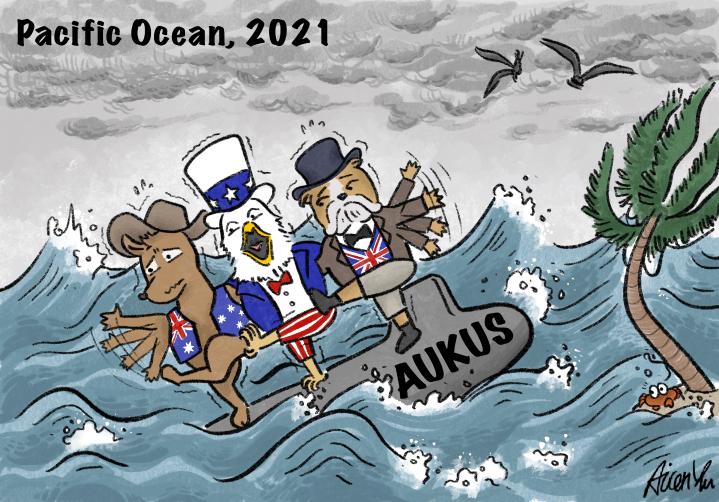AUKUS: a perspective from Britain

Cartoon: The show mustn't go on (Xinhua)
The AUKUS agreement should not have come as a surprise in Britain: the Tory government's post-Brexit trajectory had already become apparent. Since the 2019 election win, it had increased defence spending by 26 percent; lifted the cap on nuclear warheads by 40 percent in violation of the Nuclear Non-Proliferation Treaty (NPT); and set its security and defence on an 'Indo-Pacific tilt', dispatching the Queen Elizabeth carrier strike group to the South China Sea in the biggest mobilisation of armed forces since the 1982 Falklands War [also known as the Malvinas War - Editor].
AUKUS commits the US and UK to providing Australia with nuclear-powered submarines, a sharing of weapons-grade uranium which violates the NPT stipulation on the use of nuclear technology for peaceful purposes. To defend the rules-based international order, the AUKUS powers evidently have to elevate themselves above the rules. The arrangement may well set a precedent for others - India, Japan, South Korea - to seek their own nuclear-powered submarine fleets. From there, the further spread of nuclear weapons is just a short step away.
Since nuclear-propelled submarines can stay submerged longer than the French diesel-powered vessels, their 'hunter-killer' capacity will enhance Australia's military reach right up into North East Asia.
Although not named directly, China is clearly the AUKUS target. Former prime minister, Theresa May, expressed certain British establishment concerns when she questioned whether the pact might lead Britain into a war with China over Taiwan.
Claiming to stabilise the Indo-Pacific, AUKUS, as an outside 'Anglosphere' intervention, has already caused upset within the region. ASEAN members are concerned about a regional arms race; Pacific Island states fear an overstepping of the South Pacific Nuclear Free Zone Treaty; whilst the Japanese government is making bolder signals with regard to Taiwan. Beyond the region, the deal has created difficulties in NATO by antagonising France, and may also impact on the Iran nuclear deal: if weapons-grade nuclear materials are simply handed over to Australia, why restrict Iran?
These disruptions foreshadow a radical New Cold War international realignment.
The US has long aspired to create an Asian NATO. However, Australia's fears over Japan's post-war rearmament; the popularity of the 'peace clause' in Japan's constitution; the South East Asian nations' reluctance to compromise their hard-fought independence and India's position of non-alignment have all stood in the way.
For decades, the US has worked to wear away these obstacles, with AUKUS now to spearhead a network of multilateralisms promoted by the Biden administration of US: the Quad, NATO with its Indo-Pacific turn, the newly-revived G7, the summit of democracies. If not ready for direct military commitment, these groupings may serve as appropriate in the delivery of US Cold War strategies - in logistics support, data- and technology-sharing, economic warfare or exclusive supply chains - forming a dragnet to draw 'democratic' states away from economic and diplomatic links with 'authoritarian regimes'.
AUKUS is also to cover AI, quantum computing, cyber- and undersea capabilities. As US Secretary of State, Anthony Blinken, setting out the Biden administration's stall, stated: 'whether techno-democracies or techno-autocracies are the ones who get to define how technology is used … will go a long way toward shaping the next decades.'
If the Indo-Pacific is the 'pacing theatre', AUKUS will then set the pace in the military use of new technologies, integrating security- and defence-related science and technology as well as industrial bases and supply chains centred on US core technologies.
The three AUKUS members are all part of the 5 eyes intelligence-sharing network, and with Australia's ASPI and the BBC churning out the 'China threat' narratives, this all becomes very suggestive of a globalising of what former CIA analyst Ralph McGovern has called a new Military-Industrial-Congressional-Intelligence-Media-Academia-Think-Tank (MICIMATT) complex.
Britain, trading on its links with its former Asian colonies, and not least on leadership of the 5 power defence arrangements with Australia, New Zealand, Singapore and Malaysia, seeks a role as subcontractor-in-chief of US foreign and military policy in the region. A Cold War arms race is seen to offer profits for British arms companies, and the UK may hope, as an exclusive rule-maker at the technological frontiers, for rewards in IPR. But it is the US that will claim the lion's share of any benefits.
As AUKUS takes shape over the coming months, so will Global Britain's future direction. Merging UK armed forces into Indo-Pacific war-fighting strategies will further surrender UK national security to the US. Corralling off ever larger areas of UK business from China-related activities, with the science and academic communities also following a militarised agenda will forfeit other opportunities for cooperation.
Despite these huge potential implications, all in the name of upholding democracy in the world, there is remarkably little public discussion. AUKUS hawks are banking on the popularity of an Anglo-Saxon alliance, appealing to the basest white racism of the colonial mentality.
But the last thing the British people can afford is the costly burden of perpetual military upgrading: they want an end to the pandemic, economic recovery and solutions to climate change - this means they will have to take the road of international cooperation.
Jenny Clegg is a former lecturer in Asia Pacific Studies at a UK university and is active in the British peace movement.
The opinions expressed in the article reflect those of the author, and not necessarily those of People's Daily Online.
Photos
Related Stories
- AUKUS deal endangers international security order: Chinese, Russian representatives
- AUKUS: How it breaches international law
- China warns against AUKUS, to make meetings routine with Pacific island countries, enhancing ties to higher level
- AUKUS nuclear submarine deal threatens global stability
- Putin says AUKUS harms regional stability
Copyright © 2022 People's Daily Online. All Rights Reserved.










